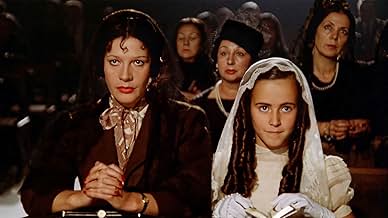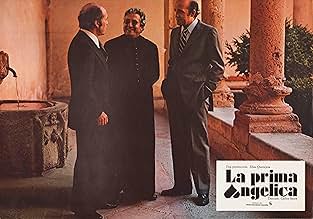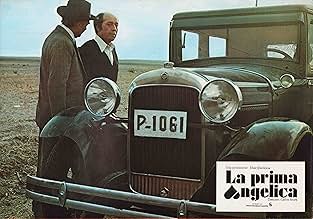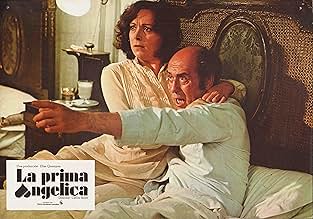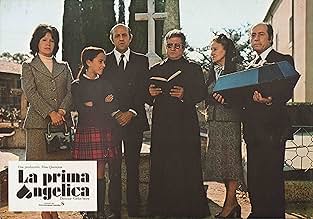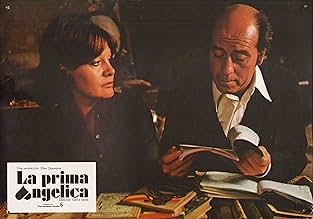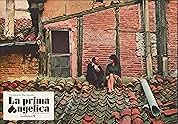VALUTAZIONE IMDb
7,3/10
1291
LA TUA VALUTAZIONE
Aggiungi una trama nella tua linguaAfter being given permission to re-inter his mother's body in their family vault, a middle-aged man who survived the Spanish Civil War as a child returns home and relives old memories.After being given permission to re-inter his mother's body in their family vault, a middle-aged man who survived the Spanish Civil War as a child returns home and relives old memories.After being given permission to re-inter his mother's body in their family vault, a middle-aged man who survived the Spanish Civil War as a child returns home and relives old memories.
- Regia
- Sceneggiatura
- Star
- Premi
- 2 vittorie e 2 candidature totali
José Luis López Vázquez
- Luis
- (as Jose Luis Lopez Vazquez)
María Clara Fernández de Loaysa
- Angélica niña
- (as Mª Clara Fernandez de Loyasa)
María de la Riva
- Abuela
- (as Maria de la Riva)
Antonio Canal
- Soldado
- (as Tony Canal)
José Luis Heredia
- Felipe Sagún
- (as Jose L. Heredia)
Recensioni in evidenza
When the single middle-aged Luis (José Luis López Vázquez) travels from Barcelona to bury the remains of his mother in the vault of his family in Segovia, he is lodged by his aunt Pilar (Lola Cardona) in her old house where he spent his summer of 1936 with her. He meets his cousin Angelica, who was his first love, living on the first floor with her husband and daughter, and he recalls his childhood in times of the Spanish Civil War entwined with the present.
This sensitive movie is a touching love story having the background of the beginning of the Spanish Civil War with the coup d'État of General Francisco Franco in July 1936. The original resource of Carlos Saura, using the same actor (José Luis López Vázquez) representing the boy and the man, is awesome. The forbidden love for his cousin, the dogmatic education of the Catholic Church, the relationship with his family are revived by Luis in this simple and unknown gem. My vote is seven.
Title (Brazil): "A Prima Angélica" ("The Cousin Angelica")
This sensitive movie is a touching love story having the background of the beginning of the Spanish Civil War with the coup d'État of General Francisco Franco in July 1936. The original resource of Carlos Saura, using the same actor (José Luis López Vázquez) representing the boy and the man, is awesome. The forbidden love for his cousin, the dogmatic education of the Catholic Church, the relationship with his family are revived by Luis in this simple and unknown gem. My vote is seven.
Title (Brazil): "A Prima Angélica" ("The Cousin Angelica")
Carlos Saura's provocative COUSIN ANGELICA stirred a vehement protest from the Spanish Right upon its release during the twilight years of Francisco Franco's dictatorship. The film focuses on Luis (Vázquez), an unmarried, middle-aged business man in Barcelona, bringing his long-deceased mother's bones to bury in her family crypt in Sevogia. En route, past memories well up, he begin to re-enact the events happened almost forty-years ago during the Spanish Civil War, his days of sojourn with his mother's family, includes his first cousin Angelica (played by Canakejas as the adult and de Loaysa as the child), his first love.
The most unconventional tack is that Saura decides to let Vázquez play both the adult and child version of Luis, while Canalejas, Delgado and de Loaysa play two nuclear families in both time- lines: Angelica's family in the present, and the one during the wartime, a 9-year-old Angelica and her parents. This stipulation evidently creates some initial puzzlement and requires viewers more patience to get the narrative which frequently jumps back-and-forth. And one key giveaway is Vázquez's performance, who can convincingly switch between a grown-up's urbane refinement and a child's wide-eyed obedience, the latter is quite demanding for an actor is his fifties.
Recollections are intermingled with Luis' present mental state, gradually, audience will be notified there is a deep chasm between his father and his mother's family, they are on opposite sides in political slants during that tempestuous time, his parents are called the black sheep of the family, which corners Luis in an awkward situation staying with them, where family bond is virtually marred by politics.
However, the puppy love with Angelica symbolises the most innocent and beautiful souvenir in this experience, a stolen kiss, being each other's playmates, sharply contrasts with the marriage fetters she is entrapped in presently, rekindled romance glistens faintly, but eventually he is not the knight in shining armour, the sadness of adulthood.
Saura also registers strongly with symbolically religious projections which has poisoned and continues haunting Luis' psyche to date, the mortified nun, with a lock sealing her lips, and a bleeding hole in her palm, is his incubus, which is startling to watch. A priest's inculcation of a 11-year-old boy's tragic death from an explosion is bordering on sheer hectoring, and the ensuing bombarding in the school echoes the opening shots, which at first glance resemble an atmospheric modern-dancing rendition.
With hindsight, COUSIN ANGELICA seems to be less pungent in its anti-war and religion innuendos by nowadays' criterions, other than a beguilingly concocted labyrinth juxtaposing disjointed memories with a disillusioned reality, but sometimes it is overcautious to lay bare the elephant-in-the-room, whereas in other time, over-mystifying the machination of reminiscence.
The most unconventional tack is that Saura decides to let Vázquez play both the adult and child version of Luis, while Canalejas, Delgado and de Loaysa play two nuclear families in both time- lines: Angelica's family in the present, and the one during the wartime, a 9-year-old Angelica and her parents. This stipulation evidently creates some initial puzzlement and requires viewers more patience to get the narrative which frequently jumps back-and-forth. And one key giveaway is Vázquez's performance, who can convincingly switch between a grown-up's urbane refinement and a child's wide-eyed obedience, the latter is quite demanding for an actor is his fifties.
Recollections are intermingled with Luis' present mental state, gradually, audience will be notified there is a deep chasm between his father and his mother's family, they are on opposite sides in political slants during that tempestuous time, his parents are called the black sheep of the family, which corners Luis in an awkward situation staying with them, where family bond is virtually marred by politics.
However, the puppy love with Angelica symbolises the most innocent and beautiful souvenir in this experience, a stolen kiss, being each other's playmates, sharply contrasts with the marriage fetters she is entrapped in presently, rekindled romance glistens faintly, but eventually he is not the knight in shining armour, the sadness of adulthood.
Saura also registers strongly with symbolically religious projections which has poisoned and continues haunting Luis' psyche to date, the mortified nun, with a lock sealing her lips, and a bleeding hole in her palm, is his incubus, which is startling to watch. A priest's inculcation of a 11-year-old boy's tragic death from an explosion is bordering on sheer hectoring, and the ensuing bombarding in the school echoes the opening shots, which at first glance resemble an atmospheric modern-dancing rendition.
With hindsight, COUSIN ANGELICA seems to be less pungent in its anti-war and religion innuendos by nowadays' criterions, other than a beguilingly concocted labyrinth juxtaposing disjointed memories with a disillusioned reality, but sometimes it is overcautious to lay bare the elephant-in-the-room, whereas in other time, over-mystifying the machination of reminiscence.
For this year, I have decided to concentrate on movies favourably appraised by the two guides I grew up with – Leslie Halliwell's and Leonard Maltin's – or were otherwise mentioned in a couple of polls ranking the top films of all time. With this in mind, of about a score of Saura titles in my possession and which I had opted to schedule for viewing on the occasion of his birthday, the number has been reduced to just 5 – and these are not necessarily among his more renowned or even intriguing efforts!
The film under review falls, to my mind, in the latter category – despite its having won the Jury Prize at Cannes. Having now watched it for myself, there is no doubt that COUSIN ANGELICA is indeed worthy of merit; however, I must also admit that it was rather heavy-going an experience for a number of reasons. First off, it seems to me that certain native film-makers are obsessed with the Spanish Civil War – since it regularly features in their work (as here), and yet the conflict eventually comes to have no real bearing on the central plot! In the same vein, there is a distinct whiff of anti-clericalism (including nightmarish visions of a worm-infested and stigmata-bearing nun) running through it but, again, no specific point is being made by this stance!
Incidentally, I wonder why such an ordinary title (which also misleadingly equates it with a contemporaneous sub-genre in Italian cinema!) was chosen for a film that is essentially so rich in subtext – relating to the impossible love affair at the heart of the narrative between the single protagonist and his unhappily married cousin – especially since several actors play multiple roles throughout while the hero remains the same, i.e. middle-aged, the entire time (even when supposed to be a child and, at one point, gets to see himself as he is imagining a meeting with his own long-dead parents)! Curiously enough, the end titles reveal that the film was dedicated to Charles and Oona Chaplin, the parents of Saura's then-companion (and frequent collaborator) Geraldine who, however, does not appear in this one...and I do wonder what the British comic made of the whole thing!
The film under review falls, to my mind, in the latter category – despite its having won the Jury Prize at Cannes. Having now watched it for myself, there is no doubt that COUSIN ANGELICA is indeed worthy of merit; however, I must also admit that it was rather heavy-going an experience for a number of reasons. First off, it seems to me that certain native film-makers are obsessed with the Spanish Civil War – since it regularly features in their work (as here), and yet the conflict eventually comes to have no real bearing on the central plot! In the same vein, there is a distinct whiff of anti-clericalism (including nightmarish visions of a worm-infested and stigmata-bearing nun) running through it but, again, no specific point is being made by this stance!
Incidentally, I wonder why such an ordinary title (which also misleadingly equates it with a contemporaneous sub-genre in Italian cinema!) was chosen for a film that is essentially so rich in subtext – relating to the impossible love affair at the heart of the narrative between the single protagonist and his unhappily married cousin – especially since several actors play multiple roles throughout while the hero remains the same, i.e. middle-aged, the entire time (even when supposed to be a child and, at one point, gets to see himself as he is imagining a meeting with his own long-dead parents)! Curiously enough, the end titles reveal that the film was dedicated to Charles and Oona Chaplin, the parents of Saura's then-companion (and frequent collaborator) Geraldine who, however, does not appear in this one...and I do wonder what the British comic made of the whole thing!
It deals with a single middle-aged man : Jose Luis López Vázquez who from Barcelona goes to bury his mother: Encarna Paso in Segovia, Castilla y León .There he's lodged at the old house of his aunt Pilar : Lola Cardona. Along the way, he recalls his past events in 1936 when the Spanish Civil War took place. There he meets his cousin Angelica : Lina Canalejas as an adult , Clara Fernández as a little girl , with whom he had his first romance , but the old flame rekindles again.
A thought-provoking and brooding film dealing with a mature man and his records , loneliness and nostalgy for past times and including some surrealist elements in Luis Buñuel style . Sensitive film full of feeling , haunting mood-pieces , wonderful images and sense of style . This film was notorious in the years of the Franco's downfall dictatorship including provoking and polemic issues . ¨La Prima Angélica¨¨ is one of Saura's undisputed masterpieces and fundamental in his filmography where shows efficiently some peculiar characters and shot at the height of his creativity, in a period cultural difficult, where the enormous censorship of the political regime exacerbated the ingenuity and imagination of the scriptwriters . It follows the wake of Ingmar Bergman's Fresas Salvajes or Wild strawberries in which the main role becomes involved into his own infancy records . Here stands out the extraordinary acting by the great Jose Luis López Vázquez as the single man who is disturbed by past happenings by living again himself those deeds from Civil War . He is well accompanied by a good cast , such as : Lina Canalejas , Encarna Paso , Fernando Delgado , Marisa Porcel, Luis Peña , Julieta Serrano, among others .
It contains an evocative cinematography by Luis Cuadrado , Saura's regular . The motion picture perfectly produced by magnificent producer Elias Querejeta was stunningly directed by Carlos Saura , a good Spanish movies director. He began working in cinema in 1959 when he filmed ¨Los Golfos ¨(1962) dealing with juvenile delinquency from a sociological point of view . From his first film : Los Golfos , Saura has got a long and prestigious career . He subsequently made LLanto por Un Bandido (1964) starred by an European all-star-cast . Saura is a well recognized filmmaker both nationally and internationally, and in proof of it he won many prizes among which there are the following ones: Silver Bear in Festival of Berlin for Peppermint Frappé (1967) and the successful La Caza (1966) that also won numerous prizes in International Festivals and in which four characters facing each other and terminating into a jarring burst of violence . Saura achieved Special Jury Awards in Cannes for La Prima Angélica (1974), in 1973, and for Cría Cuervos (1976), in 1975. Also, the film Mamá Cumple Cien Años (1979) got an Oscar nomination in 1979 as the best foreign film, and it also won the Special Jury Award at the San Sebastian Festival. He subsequently made ¨Deprisa , Deprisa¨ based on facts about juvenile delinquency in Spain since the 80s , as he tried to take a position in favour of outcast people and he got to make a both lyric and documentary-style cinema . In 1990, he won two Goya , The Spanish Oscar , as best adapted screenplay writer and best director . Saura became an expert on Iberian musical adaptations as ¨Carmen¨ , ¨Amor Brujo¨ , ¨Bodas De Sangre¨ , ¨Sevillanas¨ , ¨Iberia¨ , ¨Salome¨ , ¨Fado¨, ¨Flamenco ¨ and even recently Opera as ¨Io , Don Giovanni¨ . Rating : 7/10 , notable . The pick will appeal to José Ñuis López Vazquez fans.
A thought-provoking and brooding film dealing with a mature man and his records , loneliness and nostalgy for past times and including some surrealist elements in Luis Buñuel style . Sensitive film full of feeling , haunting mood-pieces , wonderful images and sense of style . This film was notorious in the years of the Franco's downfall dictatorship including provoking and polemic issues . ¨La Prima Angélica¨¨ is one of Saura's undisputed masterpieces and fundamental in his filmography where shows efficiently some peculiar characters and shot at the height of his creativity, in a period cultural difficult, where the enormous censorship of the political regime exacerbated the ingenuity and imagination of the scriptwriters . It follows the wake of Ingmar Bergman's Fresas Salvajes or Wild strawberries in which the main role becomes involved into his own infancy records . Here stands out the extraordinary acting by the great Jose Luis López Vázquez as the single man who is disturbed by past happenings by living again himself those deeds from Civil War . He is well accompanied by a good cast , such as : Lina Canalejas , Encarna Paso , Fernando Delgado , Marisa Porcel, Luis Peña , Julieta Serrano, among others .
It contains an evocative cinematography by Luis Cuadrado , Saura's regular . The motion picture perfectly produced by magnificent producer Elias Querejeta was stunningly directed by Carlos Saura , a good Spanish movies director. He began working in cinema in 1959 when he filmed ¨Los Golfos ¨(1962) dealing with juvenile delinquency from a sociological point of view . From his first film : Los Golfos , Saura has got a long and prestigious career . He subsequently made LLanto por Un Bandido (1964) starred by an European all-star-cast . Saura is a well recognized filmmaker both nationally and internationally, and in proof of it he won many prizes among which there are the following ones: Silver Bear in Festival of Berlin for Peppermint Frappé (1967) and the successful La Caza (1966) that also won numerous prizes in International Festivals and in which four characters facing each other and terminating into a jarring burst of violence . Saura achieved Special Jury Awards in Cannes for La Prima Angélica (1974), in 1973, and for Cría Cuervos (1976), in 1975. Also, the film Mamá Cumple Cien Años (1979) got an Oscar nomination in 1979 as the best foreign film, and it also won the Special Jury Award at the San Sebastian Festival. He subsequently made ¨Deprisa , Deprisa¨ based on facts about juvenile delinquency in Spain since the 80s , as he tried to take a position in favour of outcast people and he got to make a both lyric and documentary-style cinema . In 1990, he won two Goya , The Spanish Oscar , as best adapted screenplay writer and best director . Saura became an expert on Iberian musical adaptations as ¨Carmen¨ , ¨Amor Brujo¨ , ¨Bodas De Sangre¨ , ¨Sevillanas¨ , ¨Iberia¨ , ¨Salome¨ , ¨Fado¨, ¨Flamenco ¨ and even recently Opera as ¨Io , Don Giovanni¨ . Rating : 7/10 , notable . The pick will appeal to José Ñuis López Vazquez fans.
"La prima Angélica" (1974) is one of the most sensitive and important movies of Carlos Saura. Set in 1974, one of the most transcendental moments in Spain with the debacle of franquism, the film is a wonderful portrayal of the effects of the Spanish civil war in a family and the love that Luis -great José Luis López Vázquez- feels about his cousine Angélica -beautiful Lina Canalejas-. The childhood, the adolescence of both -Luis and Angélica- and their forbidden love is seen in the past and in the present with a nice nostalghia. Carlos Saura creates a great love story with an historical background -spanish civil war- and shows to the audience a passional game between past and present reality. "La prima Angélica" is for me one of the most important movies of the Spanish Cinema. This is one of the masterpieces of Carlos Saura.
Lo sapevi?
- QuizThe film is dedicated to Oona and Charlie. The names refer to Oona Chaplin and Charles Chaplin, the parents of Geraldine Chaplin, Carlos Saura's partner by the time of release of the film.
- ConnessioniReferenced in Saura(s) (2017)
- Colonne sonoreRocío
Written by Rafael de León (as León) and Manuel L. Quiroga (as Quiroga)
Performed by Imperio Argentina
I più visti
Accedi per valutare e creare un elenco di titoli salvati per ottenere consigli personalizzati
- How long is Cousin Angelica?Powered by Alexa
Dettagli
- Data di uscita
- Paese di origine
- Sito ufficiale
- Lingua
- Celebre anche come
- Cousin Angelica
- Luoghi delle riprese
- Plaza Mayor, Segovia, Castilla y León, Spagna(hotel exteriors)
- Azienda produttrice
- Vedi altri crediti dell’azienda su IMDbPro
- Tempo di esecuzione1 ora 47 minuti
- Mix di suoni
- Proporzioni
- 1.66 : 1
Contribuisci a questa pagina
Suggerisci una modifica o aggiungi i contenuti mancanti

Divario superiore
By what name was La cugina Angelica (1974) officially released in Canada in English?
Rispondi
